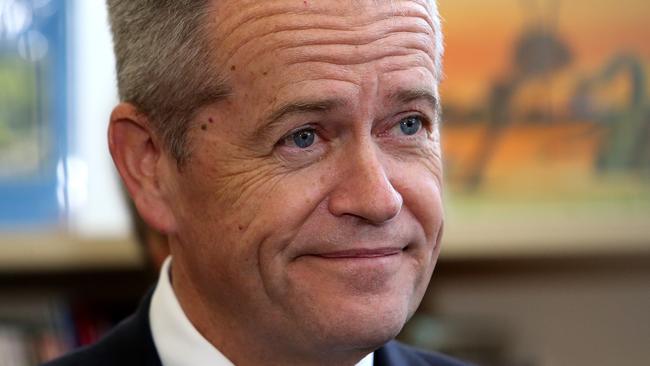Aged care next for a taxpayer-funded pay rise
Pressure is growing on Labor leader Bill Shorten to endorse a taxpayer-funded wage rise for aged-care workers.

Bill Shorten has left open a Labor government granting taxpayer-funded wage increases to “underpaid” aged-care workers from next year, as he sought to contain demands for him to extend his $10 billion pre-election wage subsidy promise to childcare workers to other sectors.
After declaring on Monday that Labor had “picked childcare workers to go first”, the Opposition Leader moved to neutralise government attacks on Labor’s wages policy, insisting childcare was a “unique” sector and the proposed funding model was a “template which we will only use in childcare”.
But he left open the government funding pay rises for aged-care workers after the aged-care royal commission makes its findings, scheduled for April 30 next year. An interim report is due in October: “I think aged-care workers are underpaid. But we have a royal commission under way — let’s see what the royal commission produces.
“I want to pay a compliment to our aged-care workers. They do a lot of work with a lot of vulnerable people. I think that we need to invest more in aged care generally.
“But let’s have the royal commission. The solution we have looked at for early childhood educators is a recognition nothing else has worked. They are underpaid, highly trained, and it is long overdue that we do the right thing.”
Deputy Opposition Leader Tanya Plibersek also signalled Labor could support pay rises for aged-care workers after the royal commission. She said the previous Labor government had recognised social and community sector workers were underpaid and committed extra funding to lift their wages: “To be honest, I think down the track when we see the outcome of the royal commission into aged care that there’ll be other areas where we will have to more appropriately pay highly skilled. highly competent workers that are underpaid — frankly, largely because they’re women.’’
Council on the Ageing chief executive Ian Yates said yesterday he would press Labor to commit to funding pay rises for aged-care workers as a “matter of priority” if Mr Shorten wins the election.
Mr Yates said the royal commission had been instructed to take account of previous reviews, including a government-commissioned report showing aged-care workers were paid on average 15 and 10 per cent less than their peers at hospitals.
He said the estimated full cost of the pay rises and training required for aged-care workers was $3 billion a year but wage increases could be phased in to reduce cost pressures on the government.
“I understand they [Labor] may not have the funds in their election budget to commit to that. What I would want them to do is to commit to looking at that as a matter of priority if they are in government,’’ he told The Australian.
Mr Yates said childcare pay rises should be a “first step” but the aged-care workforce was also an “underpaid, undertrained workforce, predominantly female, dealing with a vulnerable population”.
“We have to realise in this country, both in terms of workforce and in terms of the number of homecare packages we are providing, that expenditure increases in the billions are necessary if we are not going to end up with poor quality aged care and people who have been assessed as needing care, dying at home without it,’’ Mr Yates said.
Australian Chamber of Commerce and Industry chief executive James Pearson welcomed Mr Shorten clarifying Labor’s pre-election commitment to wage subsidies was confined to childcare.
But he said small business, already facing the potential cost of a Labor government reversing penalty rate cuts, was concerned the wage subsidy “genie is out of the bottle and it won’t be easy to put it back in”.
He also called on Labor to release more details of its proposed multi-employer bargaining policy before the May 18 election.
Labor last year cleared the way for unions to pursue multi-employer bargaining beyond low-paid industries if Mr Shorten wins power, backing the right of unionists to make wage claims on multiple employers where enterprise bargaining has failed. Mr Shorten said last week he was not convinced industry bargaining should be universally available.
Mr Pearson said Labor was proposing “significant changes to our workplace relations system, which represent a sweeping departure from our current system”.
“Employers and workers alike deserve to know the detail behind the opposition’s industry-wide bargaining and other policies as soon as possible so we know exactly what to expect from Labor if they win government,’’ he said.
“Small businesses deserve to know whether they will become collateral damage in the union movement’s efforts to secure new and unparalleled rights through industry-wide bargaining.”




To join the conversation, please log in. Don't have an account? Register
Join the conversation, you are commenting as Logout